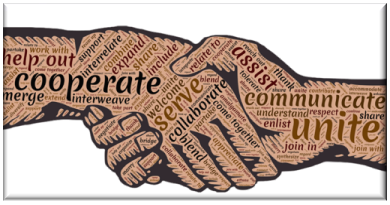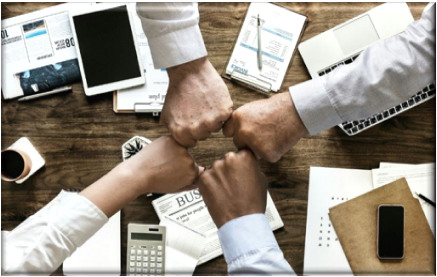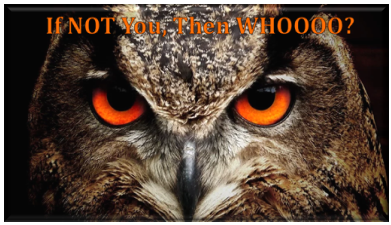When was the last time that you thought Collaboration could assist you to get through Conflict? Some say Never… Some give a blank stare. Well, believe it or not, Part 4 of our Conflict Resolution Tactics is an essential step to embrace! We are excited to share some ideas with you about Collaboration!

Collaboration is the action of working with someone to produce or create something. It is a process of working together to bring forth a project, task or achieve a goal.
Collaboration is a way to communicate with each other
and cooperate in a way that is in the interest of all parties involved. It has a way to unite and merge us together with the potential to expand, share, support and blend.
Collaboration comes when you have implemented the other tactics that we have introduced to you in this Conflict Resolution Tactics 4-part series. Those areas are:
- Part 1 – Diffuse
- Part 2 – Accountability
- Part 3 – Identify
- Part 4 – Collaboration
Most Conflicts are a result of a Breakdown in Communication. Let’s consider the cause and effect. When we have a breakdown in our communication, we naturally see how people get hurt feelings, say things in the heat of the moment, call names or say things they do not mean, snap at each other and say or do things to get even. When a Breakdown in Communication is there, Collaboration is less likely to work for both parties, so be sure to go through Diffuse, Accountability and Identify before you decide to use Collaboration as your answer. 😉
For Collaboration to have its full effect and support all involved, there are some skill set requirements:
- Leadership skills
- Problem Solving skills
- Knowledge Sharing skills
- Good Communication skills
- Cooperation Skills
When these five skill sets are present you can have a united front in collaborating with everyone and uniting as

a group or team for the best results.
But we also suggest that you have another list of qualifiers that we call Collaboration Characteristics. It is next to impossible to have a successful collaboration without having basic characteristics that are valued by all involved. Here is a list of some of the most important, but please identify the characteristics that you feel are important as well:

- Trust
- Safety
- Diversity
- Creativity
- Respect
- Empowerment
- Positivity
- Willingness
- Leadership
- Courage
- Loyal
- Effective communication
According to psychologists and a lot of data on our big wide Web, we as people are programmed to say NO. This happens all the time. We first look for why we should not do what someone else suggests or that they want to do what we want to do. It is proven over and over, yet it is the most restrictive behavior we could ever allow. Because we are first programmed to say no or consider what we want first, we get to learn to be a YES AND Person. This is inclusive and allows others to feel valued, appreciated, heard, and feel that they belong.
Think about this in your professional and personal life. As we are more accepting and consider all ideas or suggestions of a spouse or child, we get along better. There is more unconditional love. When we do this in our professional life, we seem to be more accepting, less judgmental, easier to work with and liked by almost everyone.
Why do we want to do this?
- Builds Better Relationships
- Creates a Safe Place for Everyone
- Shows Respect, Love and Acceptance
- Promotes a Culture of Creativity
- Everyone can Grow and Achieve
- All members feel heard, respected, and valued.
- Allows everyone to work at their highest potential.
- Promotes teamwork and growth
In our video we go into a lot of detail on all this information. I suggest that you watch it. We even do an “IMPROV” activity for you on this video. Improv is a great activity to get ideas flowing and to allow creativity to surface.

We have “IMPROV” that we can watch on TV and even as entertainment. This is completely built on the YES AND philosophy. It reinforces that you accept what is said no matter what and add to it. These can be very entertaining and fun. In our own lives we can do well by adding this to our communication as we collaborate. The minute we say no or contradict the person’s idea we have shut down the creative process and it shuts down everything that could be created. Don’t get me wrong, there are many times that it might be a bad idea, but when we are trying to create, good ideas are sometimes not so great and bad ideas can sometimes be good ones! Watch out video to see the bad idea that turned into a good idea – Pigs on Pot. You will be surprised!
These past few years we have watched as everyone has had to take on the YES AND, in their collaboration, in both personal life and Professional life. Whether it was a good idea or not, we have been faced with moving forward and making it work, but look at how it has gotten us through in a pandemic or really tough times. Many of the things we adapted to have stayed and are great new additions to our lives. Here are just a few to consider:

- Homeschooling/On-line School/Options
- DoorDash, Delivery & Curbside for Restaurants
- Insta-Cart, grocery shopping and delivery done for you
- Production plants making different things than they did before, adaptation at extreme levels world wide
- Toilet Paper and almost ANYTHING delivered to your door from any store!
Collaboration, done right, will create amazing things. It will change the way you deal with Conflict Resolution. Why not fix a problem before it starts? Watch our episode today.
